|
|
|
Sort Order |
|
|
|
Items / Page
|
|
|
|
|
|
|
| Srl | Item |
| 1 |
ID:
188864
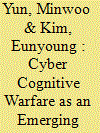

|
|
|
|
|
| Summary/Abstract |
Cognitive warfare has become the crucial war domain that determines the outcome
of modern wars. Joseph Nye pointed out, “in today’s war, it is not whose army
wins, but whose story wins,” emphasizing the importance of narratives to occupy
human minds and hearts. This has been repeatedly observed in the “War on Terror”
in Afghanistan and Iraq–Syria and the Russia–Ukraine war in 2014 and 2022.
The strategic importance of winning human cognition by the use of non-kinetic
influence operation had been similarly emphasized in the propositions of fifthgeneration warfare and Gerasimov’s suggestions. By recognizing the importance of
cognitive warfare, this paper attempts to address the concept of cognitive warfare
and suggest strategic and tactical principles for its practical operation and use.
The concept of cognitive warfare is still ambiguous, blurring together with related
concepts such as psychological warfare, information warfare, cyberwar, active
measures, and Reflexive Control. Besides, the substantial conceptual differences
between the U.S.–West and Russia have added more confusion. Thus, some
clarification to distinguish the concept of cognitive warfare from other related
terms seems necessary. Meanwhile, neither has there been any concrete proposition
of how cognitive warfare works strategically and tactically. The literature and
earlier reports only introduced various specific effects and techniques of cognitive
operations. Nevertheless, how these effects and techniques are strategically–
tactically integrated and jointly applied for a cohesive cognitive military operation
is yet to be proposed. This paper responds to two such issues of cognitive warfare.
In future warfare, the weight of cognitive warfare is anticipated to increase further.
Hopefully, this paper will be a stepping stone to rouse interest in cognitive warfare
and the development of its strategies and tactics.
|
|
|
|
|
|
|
|
|
|
|
|
|
|
|
|
| 2 |
ID:
164606
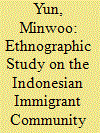

|
|
|
|
|
| Summary/Abstract |
Contrary to popular belief, South Korea is not immune from the growth of Islamic radicalism. Although no serious terrorist attack has yet occurred within the country, some worrisome incidents have been reported. Recently, an Indonesian man was arrested on the grounds that he publicly supported the Al Nusra Front, a known Al Qaeda–affiliated terrorist organization, and even attempted to depart for Syria to join the organization. The current study is a response to such an incident. It investigates whether such an incident is an isolated exception or a harbinger of the Islamic radicalization process within South Korea, particularly within the Muslim immigrant community. The current study focuses primarily on the Indonesian immigrant community within South Korea but also investigates other Muslim communities when needed, as Muslim immigrant communities are often intermingled and share similar features. The study found some worrisome developments of Islamic radicalization within the Indonesian immigrant community in particular and the Muslim immigrant community in general. Using the enculturation stress model, the current study explains that such Islamic radicalization is a pathway of the collective response to cultural adaptation stress that most Indonesian and other Muslim immigrants face within South Korea. To conduct the study, ethnographic qualitative interviews were used. Indonesian immigrants, their Korean spouses, civilian activists, civilian aid workers, government officials, police officers, immigrant agency officials, and security officials were contacted and interviewed. Each interview lasted between approximately one and four hours. The limitations of the study are also discussed.
|
|
|
|
|
|
|
|
|
|
|
|
|
|
|
|
| 3 |
ID:
077964
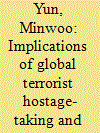

|
|
|
| 4 |
ID:
099698
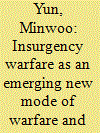

|
|
|
|
|
| Publication |
2010.
|
| Summary/Abstract |
Asymmetric insurgency warfare is the dominant form of conflict today. The global community has been observing this form of conflict around the world for the past 15 years. The current insurgency warfare is substantially different from warfare of commonsense. This new enemy, the so-called insurgents, is a group of small irregulars, terrorists, religious fanatics, and criminals. Strikingly, the highly advanced and mighty military such as the U.S. forces cannot completely win this battle, despite so much efforts and sacrifice. Rather, the inferior Islamic insurgents seem to be gaining in strength. This paper is an attempt to understand today's irony. For doing so, it tries to explain: (i) what the historical meaning of asymmetric insurgency warfare is; (ii) who this new opponent, called Islamic insurgents is; and (iii) how this new enemy fights. This paper argues that the current asymmetric insurgency warfare should be understood beyond modernity. It suggests that the insurgency warfare is a new mode of warfare, the identity of the Islamic insurgents is a network comprising insurgents, terrorists, tribal warriors, and criminals, thus blurring definitional boundaries of war-methodology. The current insurgency warfare, including the conflicts in Afghanistan and Iraq, are examined in this article. The current insurgency warfare, including the 2001 Afghanistan and the 2003 Iraq, is examined in this article.
|
|
|
|
|
|
|
|
|
|
|
|
|
|
|
|
| 5 |
ID:
083666
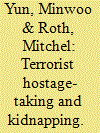

|
|
|
|
|
| Publication |
2008.
|
| Summary/Abstract |
This study examines whether there is a consistent pattern in terrorist hostage-taking and kidnapping. Script theory, developed in the discipline of cognitive psychology, explains that human behavior, whether brutal or benevolent, typically has a certain pattern to it because every human is programmed to some extent by learned experience; this experience, or script, can determine how an individual [hostage-taker/kidnapper] will respond to a particular stimulus or event [hostage-taking/kidnapping]. This study hypothesizes that script theory can be applied to cases of terrorist hostage-taking and kidnapping to determine the fate of a hostage-either to execute or to release. This study uses 764 cases of terrorist hostage-taking and kidnapping data originally collected by the Institute for the Study of Violent Groups (ISVG). Two hundred thirty four cases were finally selected for the analysis. Logistic regression method was used for the analysis
|
|
|
|
|
|
|
|
|
|
|
|
|
|
|
|
|
|
|
|
|